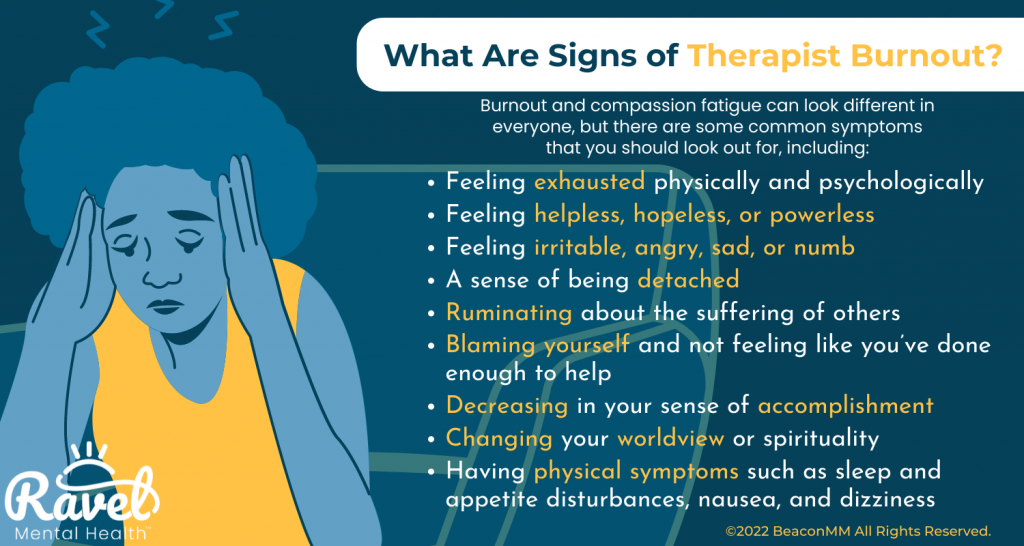Much like any other job, there is potential for therapists to face burnout. You may feel emotionally drained from helping your clients through their problems, or you may struggle with finding the motivation to keep building your clientele. Either way, letting your tank hit the empty mark can negatively impact your clients as well as yourself.
So, how do you recognize when you’re burnt out, and how can you get back on your feet? It’s time to start walking the talk and putting into practice the advice you’ve given your clients countless times in the past. Here’s an overview of therapist burnout and what you can do to start feeling better and get back to helping your clients.
Are you looking to connect with the right clients? Sign up for Ravel Mental Health and start connecting today!
What is Therapist Burnout?
Therapist burnout is unique to people in our profession. It’s typically characterized by an overwhelming feeling of exhaustion and it can present physically, mentally, and emotionally.
We all work in this field because we love it, but you might find yourself feeling like your brain is not firing on all cylinders, like you’re more stressed than normal, like you’re irritable for no reason, like you’re strangely unempathetic towards your clients, or like nothing you’re doing at work is worthwhile. These feelings can evolve over time or pop up seemingly out of nowhere.
Therapist burnout can pop up at any stage of your career, so it’s important to prioritize self-care. Being able to identify red flags and take a beat to hit the reset button will ensure you feel healthy and happy so you can give the best possible care to each of your clients.
Here are the three most common presentations.
Physical Exhaustion
Oversleeping? Constantly craving high-calorie snacks? Can’t get off the couch? Becoming a champion procrastinator? Unable to get existed about things you normally love, such as time with friends or weekend activities? These are all signs that your energy is depleted.
Mental Exhaustion
If you’re struggling to find the words you need to express yourself, recall information you should know by heart, or solve simple everyday problems, that’s also a key sign of therapist burnout. It might even feel like your brain is broken. This can also come with a decreased sense of accomplishment. For example, you might find it more difficult to stay on top of your appointments or you may find yourself struggling to find meaning in your work.
Emotional Exhaustion
This can present as depersonalization, which is basically a loss of empathy, caring, and compassion. It’s wildly out of character for most of us, because our job requires us to build close connections with people. It can be disconcerting and it’s not unheard of to find yourself wondering, “Why don’t I care? What’s wrong with me?” Another term you may have heard associated with this is phenomenon is “compassion fatigue,” because as therapists we tend to take on a lot of the emotional burdens of our clients, and it can simply wear us out over time.
Of course, the reverse can also be true. You might find yourself feeling emotions more intensely than usual, which may include increased stress, anxiety, irritability, crying, and mood swings.
What are the Signs of Therapist Burnout?

If you’re experiencing burnout, it can be difficult to figure out why you’re struggling. You could attribute your exhaustion to your workload, working for a long period without taking a vacation, or not sleeping a regular amount. Burnout can be difficult to recognize and overcome, so knowing the signs can help you identify the cause and deal with it.
Burnout and compassion fatigue can look different in everyone, but some of the common symptoms include:
- Feeling exhausted physically and psychologically
- Feeling helpless, hopeless, or powerless
- Feeling irritable, angry, sad, or numb
- A sense of being detached or having decreased pleasure in activities
- Ruminating about the suffering of others and feeling frustrated by the cause
- Blaming yourself and not feeling like you’ve done enough to help
- Decreasing in your sense of personal and professional accomplishment
- Changing your worldview or spirituality
- Having physical symptoms such as sleep and appetite disturbances, nausea, and dizziness
Do any of these symptoms resonate with you? If so, there’s a chance you may be experiencing burnout. The first step is to acknowledge the feelings you’re having. The next step is to figure out why your energy is so low and what you need to get back on track.
Are you ready to connect with new patients? Sign up for Ravel Mental Health and start taking on clients that can remotivate your work!
How Can You Balance Self-Care When You’re Burnt Out?
Taking the time to recognize what could be causing your burnout can help you adjust to meet your needs and also help prevent it from happening again. Although you may tell your clients that they should prioritize their self-care, you may not follow those practices yourself.
It can be hard to give yourself time to step away from your work, as you want to do whatever you can to guide and nurture your clients to good health properly. However, you can’t pour from an empty well, and you can’t help others if you’re suffering yourself.
Self-care should be as much a priority for you as helping your clients. And when you make that a priority, it can help you find balance and avoid potential burnout. Here are some ways that you can mitigate feeling burnout and restore your work-life balance.
1. Practice Personal Restoration
Practicing things that are good for you, such as therapy, spiritual practice, exercise, sleep, and time with loved ones, can keep you feeling rejuvenated. You may also find it’s helpful to take some time off, such as a personal day, a long weekend, or even a vacation. If you need time to reconnect and ensure that you’re feeling at peace with yourself, you can help others.
2. Get Peer Support
Getting peer support is one of the best things you can do to help avoid burnout. If you are having a difficult challenge with one of your clients, consider consulting experts or colleagues. This can help you feel motivated to continue working with your client and figure out what is best for them.
3. Reach for Personal Goals
Although you want to ensure that your clients meet their goals, you’re not just a therapist. Making sure that you are taking the time to enjoy your hobbies and accomplish your goals outside of work is just as important. This can help you feel good about yourself and capable of helping your clients.
4. Make Time for Family and Friends
Being around those we love is essential for feeling supported to accomplish our goals. And while your career goals are important, ensuring that you’re taking the time to nurture your relationships with your friends and family is critical for you and them. Make time to engage with them by doing activities you enjoy or catch up during some downtime. Reconnecting with those you love will help you feel motivated to continue your work and ensure that your life stays as healthy as you want your clients to be.
How Can You Connect With New Clients?
Once you’re feeling refreshed and ready to jump back into your work, and you’re looking to meet new clients, we will be right here and ready to help.
Ravel Mental Health is an online platform working to connect therapists and clients easily. It works to avoid client mismatch and helps you get the clients that work with you. You’ll be able to create a therapist profile that represents who you are and what you do.
With a few easy clicks, potential clients can filter to find the therapist that works for them. They can easily book an appointment with you if you’re what they’re looking for. You can verify the appointment time and avoid playing phone tag.
Our goal is to dissolve the therapy demand gap and help therapists like you provide great services to your community. We can reduce the administrative burden you face between sessions and streamline your onboarding process so you can focus on what matters most.
Are you ready for a change? Sign up for Ravel Mental Health today to start connecting with new clients in your area!
